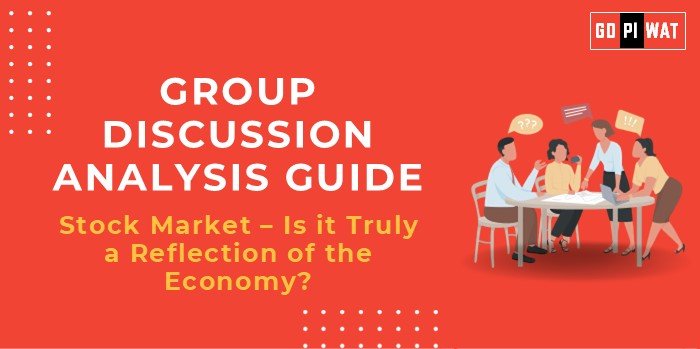📋 Group Discussion Analysis: Stock Market – Is it Truly a Reflection of the Economy?
🌐 Introduction to the Stock Market and Economy Debate
Globally, there’s an ongoing debate about whether the stock market accurately reflects economic health. With fluctuations driven by major indexes like Nifty 50 or Sensex 30, stock market highs often appear disconnected from broader economic realities. This discussion explores the stock market’s role as a potential indicator of economic sentiment, without necessarily mirroring the economy’s actual state.
📊 Quick Facts and Key Statistics
- 📈 Market Indices: Sensex recently surpassed the 85,000 mark before falling by 5%, showing volatility and its impact on economic sentiment.
- 🏦 Public Exposure: Over 50% of Americans have exposure to stock markets through retirement plans.
- 🔍 Economic Disconnect: Only top companies in Sensex and Nifty reflect India’s market sentiment, with over 5000+ other companies often overlooked.
- 🌏 Global Investment: Major global infrastructure projects, like the US’s $2 trillion plan, drive investment sentiment worldwide.
- 💻 Digital Economy and Capital Market: India’s capital market, bolstered by digital adoption, contributes significantly to capital formation.
🤝 Stakeholders and Their Roles
- 🏛️ Government: Influences investor confidence through policies, taxation, and infrastructure projects.
- 🏢 Private Companies: Large corporations impact the stock market, indirectly affecting economic indicators.
- 👨👩👧👦 Consumers and Retail Investors: Their confidence in stock trends often influences spending and economic activity.
- 🌍 International Bodies: Global economic policies and events shape the interlinked nature of markets and economies.
🏆 Achievements and Challenges
✨ Achievements
- 📊 Capital Market Strength: India’s stock market has been resilient, outperforming global emerging markets despite geopolitical and economic challenges.
- 📈 Investment Growth: Rising public interest in stocks for retirement plans indicates broad exposure to the stock market’s performance.
- 💡 Digital and Innovation Integration: India’s digital economy boosts capital formation and investment.
- 🌐 Global Interconnectedness: Global investment flows affect India’s economy, creating a platform for growth through foreign capital.
⚠️ Challenges
- ❌ Market-Economy Divergence: Despite stock gains, economic indicators show lagging GDP growth and employment rates.
- 🌍 Geopolitical and Commodity Price Risks: Global conflicts and commodity fluctuations impact market stability.
- 📉 Over-reliance on Indexes: Reliance on benchmarks like Sensex can mask performance disparities among smaller companies.
🌏 Global Comparisons
• US Stock Market Bubble: The US housing crisis of 2008 highlighted how a stock market boom could misrepresent economic stability.
• China’s Stock Market: China’s government interventions showcase another model of stock market and economic alignment attempts.
💬 Structured Arguments for Discussion
📈 Supporting Stance
“The stock market serves as a forward-looking indicator, reflecting investor confidence in future economic conditions, as seen in the recent commodity boom.”
📉 Opposing Stance
“Market performance often ignores economic fundamentals, as evident from recent stock gains despite economic growth challenges.”
⚖️ Balanced Perspective
“While the stock market can boost consumer confidence, it’s not a full economic measure, often overlooking unemployment and inflation trends.”
🛠️ Effective Discussion Approaches
- 📊 Statistical Approach: “With Sensex breaking records but overall economic indicators trailing, it’s essential to question if the market reflects true economic health.”
- 🌍 Geopolitical Context: “Global tensions and commodity price spikes highlight the stock market’s susceptibility to external factors.”
💼 Connecting with B-School Applications
Real-World Applications: The debate offers insights into financial market analysis, useful for finance projects on investment dynamics and economic indicators.
Sample Interview Questions:
- “Can stock market trends be reliable indicators for economic policy decisions?”
- “How does global investment sentiment affect emerging economies like India?”
Insights for B-School Students:
- Study market trends critically, linking them to real economic indicators.
- Analyze risks of speculative trading and their economic impacts.
- Explore the role of digital innovation in capital market resilience.


